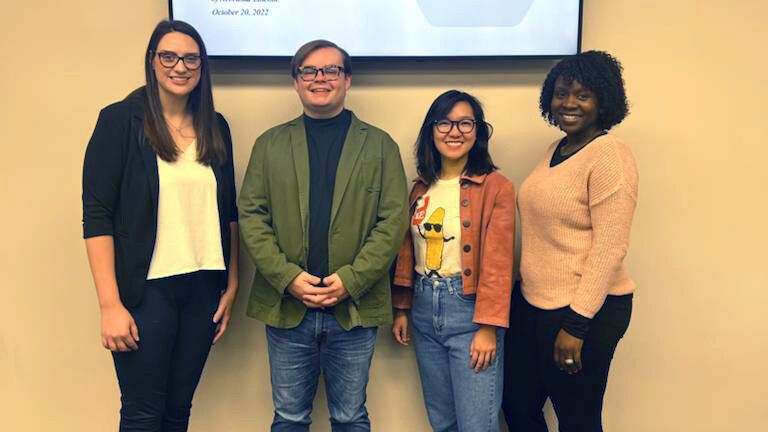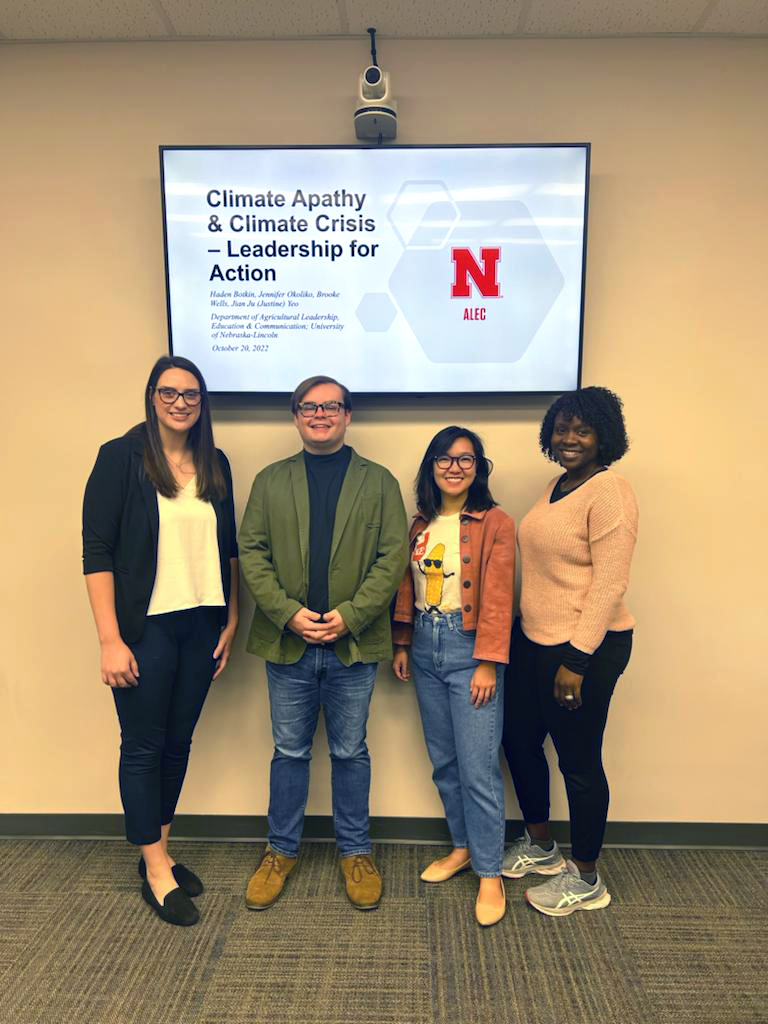
For more than 25 years, the University of Nebraska–Lincoln’s Department of Agricultural Economics has administered the annual Nebraska Rural Poll. In partnership with Rural Prosperity Nebraska and Nebraska Extension, the survey gauges Nebraskans’ views on a wide range of subjects, from climate to education. State and congressional delegates often use the findings in policy-making decisions. However, this year the Rural Poll found another use.
In October, graduate students Haden Botkin, Jennifer Okoliko, Brooke Wells and Justine Yeo, all in the Department of Agricultural Leadership, Education and Communication, competed in the International Leadership Association’s annual Student Case Competition, a first for University of Nebraska students. And they walked away with first place.
“The competition requires groups to find a case [or problem], and then use a leadership theory to not necessarily solve the case, but provide a way of thinking around that problem,” said Yeo, who is working toward her doctoral degree in leadership studies. “We each had our different roles, and my role was to look closely at the data and try to see what the perceptions are.”
The data she reviewed was from the Rural Poll.
To gather information, the Rural Poll team sends out 7,000 annual surveys to households in 86 of the state’s 93 counties, asking questions about taxes, energy, crime, water quality, education, energy, health care and the economy, as well as Nebraskans’ and communities’ wellbeing. Yeo and her team decided to focus on climate change, as, while reviewing the data, they found a discrepancy in participants’ answers.
“We discovered that for the most part there’s a sense of complacency with climate change,” Yeo said. “Yet there is a really high proportion of respondents who indicated having a sense of responsibility to future generations to preserve the environment.”
As Yeo mentioned, their task was not to solve the problem for the competition, but to provide a new way to think through the problem via the lens of leadership theories and close the gap between action and belief. They landed on two — charismatic and adaptive leadership. Charismatic leaders rely on communication and persuasion to guide those they lead. Adaptive leaders rely on transparent, back-and-forth conversations, changing their approaches to resolve issues as the problems themselves change.
What this looks like on the ground, Brooke Wells said, is that leaders identify how to bring changes to their communities through behavioral training, sharing evidence-based research from Nebraska Extension and creating community-wide initiatives to close the gap.
“We thought these would be a good approach to influence followers to enact behaviors that are more consistent with what they believe and helping followers navigate changes to stresses in the environment,” said Yeo, emphasizing the importance of aligning behaviors with beliefs for long-term benefits to communities.
The competition took place over three rounds. First, the ALEC team created a poster for their case, a two-page summary and five-minute video discussing their solution. Second, after landing in the top three, they gave a 15-minute presentation to a panel of judges. After securing the win, Botkin, Okoliko, Wells and Yeo gave another 15-minute presentation and Q&A to the entire ILA community.
While the pride of victory was reassuring, Yeo recognizes that the data from the Rural Poll has a value that goes much deeper than simply numbers.
“This information benefits Nebraskans, aggregating the voice of rural Nebraskans, and allows their voice to be heard on various policy issues,” said Becky Vogt, manager of survey research. “The repeated questions each year explore how non-metropolitan Nebraskans rate the condition of their communities and their lives, and provide community leaders direction to improve life for their residents.”
“Seeing how Nebraska as a whole perceives a specific topic, versus how I personally perceive a topic, I think is valuable,” Yeo said. “Sometimes it might align with what I feel and sometimes not, and so I think it’s just helpful to create understanding and empathy among people.”








